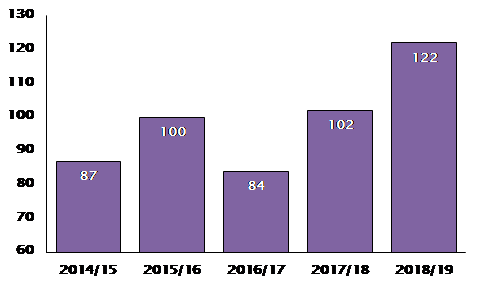
UK allergy-related food recalls jump 20% in a year to 5-year high
Food recalls relating to allergens have jumped 20% in the past year, as concerns rise over the dangers of poorly labelled foods, says RPC, the City-headquartered law firm. 122 food products were withdrawn from the market in 2018/19, compared to 102 in 2017/18.*
- Natasha’s Law will come into effect in October 2021
- 22% of recalls due to undeclared milk
Allergen recalls occur when a food product is found to contain undeclared traces of allergens, which could prove harmful, even fatal to some people. The rise in recalls related to food allergies following EU legislation that came into effect in December 2014, requiring all food labels in shops to display information on 14 different allergen types.
RPC explains that the public concern surrounding deaths that were caused by food allergens means that businesses face a severe reputational backlash if they not seen to take the problem extremely seriously.
Natasha’s Law, named after the teenager who died after eating a baguette from a sandwich chain that contained undeclared sesame, will require all businesses that sell food to print a full list of ingredients on pre-packaged food from October 2021. This may lead to further allergen related issues if mislabelled products find their way into fast food and casual dining chains. Government guidance to businesses about how to manage this requirement is expected imminently.
Of the 122 allergy recalls so far this year, 22% were due to undeclared milk, while 16% related to nuts that were not mentioned on the label.
Recently, a popcorn manufacturer which distributes to cinemas, supermarkets and theme parks across the UK, recalled 57 product lines, reflecting concerns that they may have contained undeclared milk.
Allergy recalls have impacted all of the major supermarkets in Britain, with withdrawn products ranging from soup to nuts and from beer to ice-cream.
Costs of recalling a product can potentially be significant and include legal fees; collection, transportation and destruction of the product; as well as advertising and communications. However, these costs would be dwarfed by the cost of reputational damage or from dealing with the legal and regulatory issues created by a serious allergic reaction.
Nick McMahon, Head of Health and Safety at RPC says: “Recalls of food products due to allergens have surged as businesses exercise greater caution. We could see numbers rise even further, once Natasha’s Law comes into effect.”
“Deaths from allergic reactions to food products are, thankfully, extremely rare. However, media coverage of recent cases risks tainting manufacturers in the eyes of the public.”
Gavin Reese, partner at RPC, comments further: “To protect their reputations and bottom line, businesses have to rigorously adhere to current FSA guidelines, ensuring that staff are aware of different types of allergens and fully understand their potentially hazardous consequences.”
Allergy food recalls at record 5-year high, leaping 20% from 2017/18

*Between October 1 and September 30
